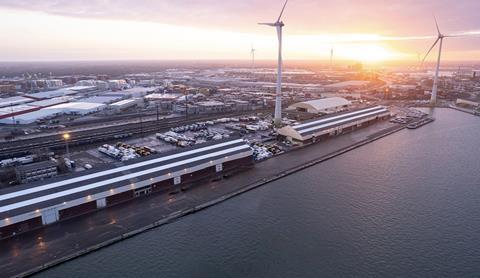Sallaum Lines’ subsidiary Sallaum Terminal is investing €20m ($21.6m) in its operations at the port of Antwerp to expand capacity and streamline logistics processes. The vehicle logistics provider said the investment was in response to pent-up demand and persistent capacity pressures as OEM volumes increase and terminal operators cope with the new requirements for battery electric vehicles (BEVs).
Sallaum Terminal at Antwerp port currently covers 240,000 sq.m, with capacity for 10,000 car equivalent units (CEU). The terminal has 1,200-metre berth that can accommodate four vessels at a time. It provides pre-delivery inspection (PDI) services for finished vehicles, breakbulk and project cargo handling and the management of heavy lifts. The terminal also has good multimodal transport links on road and rail.

As part of the investment the company will now add a multistorey car park covering 47,000 sq.m, which will add 15,000 additional CEU spaces in phase one of the expansion and 17,000 in phase two.
“While Sallaum Lines has been the sole operator at the terminal, the expansion plans will enable us to accommodate new carriers and OEMs, allowing them to benefit from our terminal’s strategic location,” said David Vanballaert, managing director of Sallaum Terminal.
The company is investing in onshore power connections that will reduce emissions by enabling vessels to connect to the local electric grid while at berth to draw power for onboard operations (cold ironing).
Sallaum Lines has ordered six new ro-ro vessels each with 7,400 CEU capacity scheduled for delivery from March 2026, bringing its vessels ordered to date up to eight in total. Two will be delivered next year.
Capacity pressures
The maritime finished vehicle logistics sector is still recovering from pandemic pressures, which saw operators ditch vessels in the face of global manufacturing hiatus only to be faced with tight capacity as vehicle manufacturing output rebounded. Carmakers, faced with delays as new vessels (running on alternative fuels) are built and delivered, have been turning to direct vessel chartering and containerised vehicle shipments among their responses.
More recent pressures include disruption to shipping routes because of conflict in the Red Sea and Gulf of Aden, which has had an impact on vehicle loading and unloading at the ports in Europe and has diverted vessels around the Cape of Good Hope. Kay Lemcke, CEO of Sallaum Shipping Lines Switzerland, told delegates at this year’s Automotive Logistics and Supply Chain Europe conference that the additional average 20 days added to global shipping times meant the average number of global rotations made per year by service providers was dropping from five to four, a 20% reduction in capacity equal to a deficit of 30 pure car and truck carriers a year.
The Belgian port of Antwerp merged with neighbouring Zeebrugge port under one operating authority in April 2022 and joint finished vehicle volumes in CY2023 stood at 3.56m (+9%).





































No comments yet